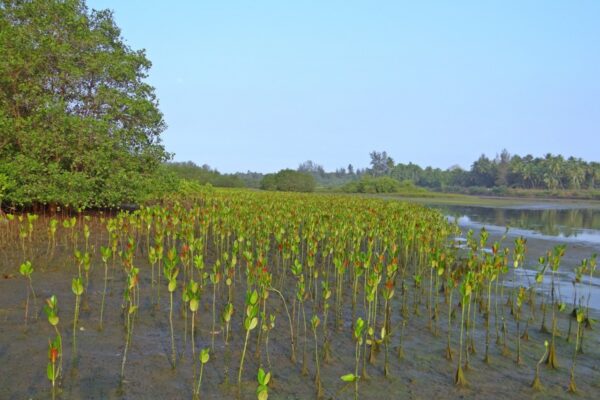For thirty years, developing nations have fought to establish an international fund to pay for the “loss and damage” they suffer as a result of climate change. As the COP27 climate summit in Egypt wrapped, they finally succeeded.
However, critics have lamented the overall outcome of COP27, saying it falls well short of a sufficient response to the climate crisis. As Alok Sharma, president of COP26 in Glasgow, noted: “Friends, I said in Glasgow that the pulse of 1.5 degrees was weak. Unfortunately it remains on life support.”
Many organisations have hailed the loss & damage outcome but equally many criticised the overall result of COP27 and that it failed to increase ambition, finance and credibility.
COP27 and the Ocean
For the first time, the ocean received a singular focus of a pavilion inside the central “Blue Zone.” It hosted approximately 60 sessions over the two-week period in Egypt. There were some notable ocean related announcements, as covered by the excellent Ocean & Climate platform:
- France expressed its support for the prohibition of seabed exploitation.
- The Egyptian presidency, together with the Government of Germany and the IUCN, launched the ENACT Initiative (Enhancing Nature-based Solutions for an Accelerated Climate Transformation) – which will coordinate global efforts to address climate change, land and ecosystem degradation, and biodiversity loss through Nature-based Solutions (NbS).
- The Netherlands has introduced the Champions Group for Deltas and Coastal Zones which will seek to harmonise action between countries and Small Island States to realise sustainable management of deltas and coastal zones.
- The recently launched High-Quality Blue Carbon Principles and Guidance outlines the conditions for high-quality blue carbon projects and credits to ensure accountability, sustainability, and transparency in the marketplace. This aligns with growing demands for blue carbon credits.
- Countries, including Germany, Ireland, Japan, Norway, the UK and the US also joined the Global Offshore Wind Alliance (GOWA), founded at COP26. The Alliance aims to be a global driving force for the uptake of offshore wind by bringing together governments, international organisations and the private sector to close the emissions gap and enhance energy security.
COP 27 Final Declaration – the ocean included
For the first time, the ocean is covered in a dedicated sub-section in the final decision:
- Article 45 “Welcomes the outcomes of and key messages from the ocean and climate change dialogue in 2022 and decides that future dialogues will, from 2023, be facilitated by two co-facilitators, selected by Parties biennially, who will be responsible for deciding the topics for and conducting the dialogue, in consultation with Parties and observers, and preparing an informal summary report to be presented in conjunction with the subsequent session of the Conference of the Parties”. This entry further cements ocean issues within the institutional mechanisms of the climate convention.
- Regarding the implementation of ocean-based climate solutions, the final decision “encourages Parties to consider, as appropriate, ocean-based action in their national climate goals and in the implementation of these goals, including but not limited to nationally determined contributions, long-term strategies and adaptation communications;” (article 46). This further recognises the portfolio of solutions that the ocean can provide to achieve the climate and sustainable development objectives.
Climate and Biodiversity: COPs 27 & 15
Speaking at the COP27 Climate Summit in Egypt, the UK Environment Secretary, Thérèse Coffey, set out UK support to protect the world’s oceans and natural habitats, and pledged £30 million to the Big Nature Impact Fund.
Outlining the importance of December’s meeting of the UN Convention on Biological Diversity in Montreal (COP15, ‘the biodiversity COP’), she is calling on countries to come together at that summit and agree a robust global plan for tackling nature loss. The UK Government pledged an additional £12 million to the Ocean Risk and Resilience Action Alliance to protect and restore vulnerable coastal communities and habitats.
At the UN CBD meeting in Montreal in December (COP15), the United Kingdom will seek further support for the target to protect at least 30% of the land and of the ocean globally by 2030 (‘30×30’).
The climate and biodiversity crises
Many have expressed disappointment that while the preamble to the COP27 final decision “underlines the urgent need to address, in a comprehensive and synergetic manner, the interlinked global crises of climate change and biodiversity loss in the broader context of achieving the Sustainable Development Goals”, the Convention on Biological Diversity is not mentioned in the final decision.

